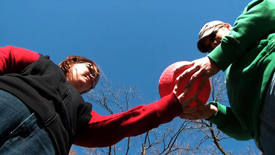Jordan Kursewicz was moved to create his film in the wake of several tragedies

When Jordan Kursewicz was a sophomore at Rutgers, he learned that a former member of his high school swim team in Texas had committed suicide. Then last fall, while on rotation at two New Jersey hospitals, he came in contact with two patients who had been admitted because they had attempted to kill themselves.
With these experiences, along with the suicide of Rutgers student Tyler Clementi last September, Kursewicz was moved to create a video for a contest to address suicide prevention on campus. In June, his 45-second public service announcement was selected from among seven entries as the winner of the contest, sponsored by Rutgers Health Services.
"My message is that if this is affecting you, then there is help at Rutgers and it's very easy to get," says Kursewicz, who learned about mental illness while a student at Rutgers' Ernest Mario School of Pharmacy. Kursewicz, who graduated in May, will start a position as a pharmacist this summer in Delaware.
The video contest is one of several projects evolving from a campuswide initiative on suicide prevention, launched in the spring of 2010 by the Rutgers Community Approaches to Suicide Prevention Working Group (CASP) The initiative's primary goals are to increase awareness of suicide and to develop strategies that could help members of the campus community make referrals to services for students in crisis.
Kursewicz's video will be shown to incoming freshmen at new student orientations, which run from through August. It also will be played on RU-tv and on the website for Rutgers Health Services.
"Long-term, what we're trying to do is reduce the incidence of the factors that contribute to suicide," says Francesca Maresca, coordinator of Health Outreach, Promotion and Education for Rutgers Health Services.
Among the projects that CASP developed this year is Peer Mental Health Educators program, in which students are trained to present workshops in residence halls, classes and at student organization meetings to increase awareness of mental health issues on campus.
Suicide is the second leading cause of death for college students, with about 1,100 students taking their own lives every year, nearly 7 in every 100,000. While suicide stems from a complex set of causes, researchers have identified several risk factors that can increase the incidence of suicide, including substance abuse, mood disorders and family or legal problems.
"Any number of issues can contribute to someone thinking about suicide," Maresca says. "It could be relationship issues, family issues … depression or mental health issues, whether diagnosed or not. It could be financial issues or legal issues or any combination of all these things."
In his video, Kursewicz decided to use a red rubber ball to represent a student suffering from depression. The video begins with the ball rolling off a breakfast table, out the door and onto the grass, where two students are playing Frisbee. The students toss the ball aside and it then tumbles into the street, bringing a silver van to a screeching halt.
As the music becomes upbeat, Kursewicz exits the van, picks up the ball and carries it into the CAPS office, at 17 Senior St. The screen then gives the CAPS phone number, 732-932-7884, and its website, rhscaps.rutgers.edu.
"The depression public service announcements that you always see on TV are always very sad and you see a specific person in them," says Kursewicz, who won an iPad in the contest. "You can't always connect to them because you think of that specific person. That's why I chose to show suicide by a ball."
Kursewicz, who produces videos as a hobby, says he was affected in different ways by the people he has come in contact with who have either attempted or committed suicide. "When you see these things around you and you see who it's affected – a kid in college or somebody in a hospital who has a good job – you realize that depression can affect anybody."
Strategies that can help students in crisis, Maresca says, include reducing isolation, easing the transition from high school into college, ensuring that resources are available and training "gatekeepers" – people who have the skills to recognize when someone needs help.
Watch Kursewicz's winning video.